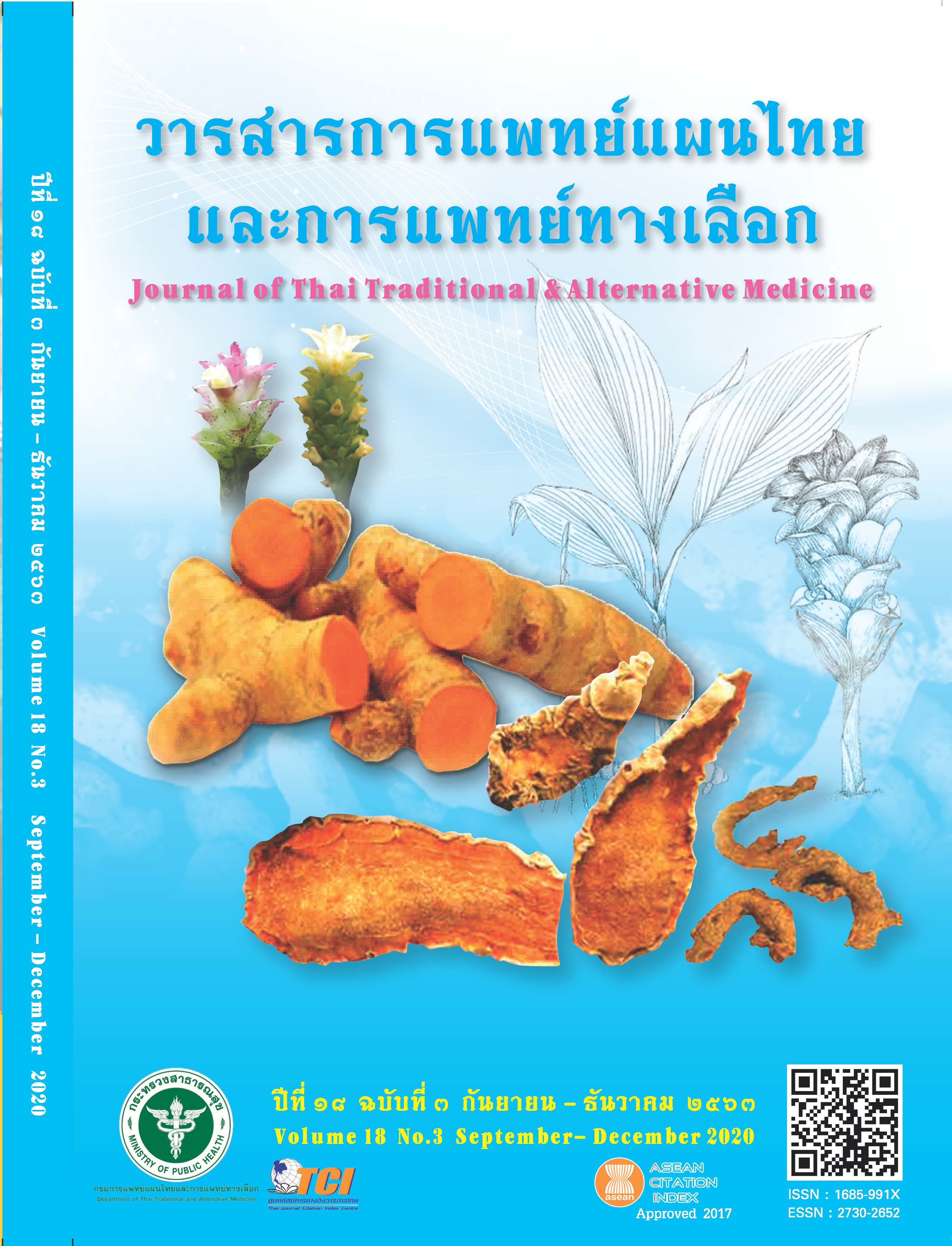Efficacy of Health Care Model for End-stage Liver Cancer Patients Using Thai Traditional Medicine in Thai Traditional Medical Hospitals, Thailand
Main Article Content
Abstract
This research, using one-group pretest-posttest quasi-experimental design, aimed to develop a health-care model using Thai Traditional Medicine (TTM) for end-stage liver cancer patients in Thai Traditional Medical Hospitals. The study was conducted during June–August 2018 in five hospitals: (1) Thai Traditional and Integrated Medicine Hospital, (2) U Thong Hospital, (3) Watthana Nakhon Hospital, (4) Khun Han Hospital, and (5) Sawang Daen Din Crown Prince Hospital. The study involved three groups of participants, selected according to the inclusion criteria: group 1, 55 multidisciplinary health-care providers; group 2, 30 end-stage liver cancer patients; and group 3, 30 primary caregivers. Data collection tools were a feasibility assessment form on health-care model implementation by health-care providers, an illness-related distress assessment form, and a satisfaction questionnaire for all three groups. Data were analyzed using descriptive statistics and a comparison of distress scores with the outcomes of care (paired t-test). The results showed that the health-care providers strongly agreed on the feasibility of TTM-based end-stage liver cancer care model implementation; and the model could solve patients’ problems and was beneficial to them at the highest level. The health-care providers’ satisfaction with the cancer care was significantly higher after model development at p = 0.05. The levels of patients’ and their caregivers’ satisfaction with the TTM services were also highest (mean scores 4.38, SD 0.46 and 4.22, SD 0.38, respectively). The health-care providers’ satisfaction was at a high level (mean score 4.12, SD 0.18). The study has demonstrated that the model can be implemented for end-stage liver cancer patients in the target population. However, a clinical outcome study to evaluate the efficacy of the model should be further carried out.
Article Details
References
Turk DC, Feldman CS. Noninvasive approaches to pain control in terminal illness: the contribution of psychological variables. Hosp J. 1992;8(1-2):1-23.
Phosri T. Palliative care for End-of-Life Patients: from hospital to home setting. [an independent study report
for the master of nursing science in adult nursing]. Khon Kaen: Khon Kaen University; 2007. (in Thai)
Strategy and Planning Division. Public health statistics A.D. 2019. Nontaburi: Ministry of Public Health; 2020.
(in Thai)
Leelananthakit S. Handbook for palliative care. Bangkok: The Agricultural Co-operative Federation Of Thailand., LTD. Institute Of Geriatric Medicine: Department of Medical Services Ministry of Public Health; 2004. (in Thai)
Maneepong S. Developing model for end of life care in critical care medicine enit, medical nursing division.
Srinagarind Hospital. [an independent study report for the master of nursing science in adult nursing]. Khon
Kaen: Khon Kaen University; 2008. (in Thai)
Tongpratheep T. Nurse’s voice in palliative care. Kuakarun Journal of Nursing. 2004;11(2):36-46. (in Thai)
Paisansuthidaj U. Palliative home care in cancer patients; 2549. (in Thai)
Petrakat P, Chantraket R, et al, editors. Situation report of Thai Traditional Medicine Folk Medicine And Alternative Medicine, B.E. 2005 - 2007. Bangkok: Manasfilm; 2007. (in Thai)
Tungsukruthai P, Nootim P, Phukanad P, Sitthikraiphong K, Charoenuch O, Kangkaew K. Situation report of Thai traditional medicine services in public health service centers B.E. 2003-2007. Traditional Medicine Research
Institute Department for Development of Thai Traditional and Alternative Medicine; 2008. (in Thai)
Shiengthong A, Rakkwamsuk P, Kerdtho S. Result of the study Thai traditional medicine hospital of Department for Development of Thai Traditional and Alternative Medicine. Bangkok. The Institute of Thai Traditional Medicine Department for Development of Thai Traditional
and Alternative Medicine. Bangkok: WVO officer of printing mill; 2015. (in Thai)
Shiengthong A, Sawatrangkun N, Kerdtho S. Clinical practice guidelines for Thai traditional medicine for the
Pilot Hospital of Thai Traditional Medicine. The Institute of Thai Traditional Medicine Department for Development of Thai Traditional and Alternative Medicine. Bangkok: Samcharoen Panich (Bangkok) Co., Ltd; 2016. (in Thai)
Health Care District Support Subdivision Technical and Planning Division Department of Thai Traditional and
Alternative Medicine. Supervision report and propulsion in Thai traditional and alternative medicine Department
of Thai Traditional and Alternative Medicine; 2017. (in Thai)
Khamsaen B. Participation of multidisciplinary teams on primary care in Tambon health promoting hospital
[an independent study report for master of social work program]. Pathum Thani: Thammasat University; 2011.
(in Thai)
Sargeant. Effective interprofessional teams: “Contact not enough” to build a team. JCEHP. 2008;28(4):228-34.
Pilaikiat R, Rittharomya J, Bootchan T. Spiritual care for chronic illness patients: experiences of professional
nurses. Thai Journal of Nursing Council. 2009;24(1):62-76. (in Thai)
Sundstrom E, DeMeuse KP, Futrell D. Work teams: applications and effectiveness. American Psychologist.
;45:120-33.
Vincent II JW (JACK). Community development practice. In: Phillips R, Pittman RH, editors. An introduction to
community development. New York: Route ledge Publisher; 2009.
Sriphattharaphinyo J. Effects of teaching and skill training for caregivers of cerebrovascular patients on
caregivers’ caring ability and patients’ health status. Nakhon Pathom: Mahidol University; 1997. (in Thai)


